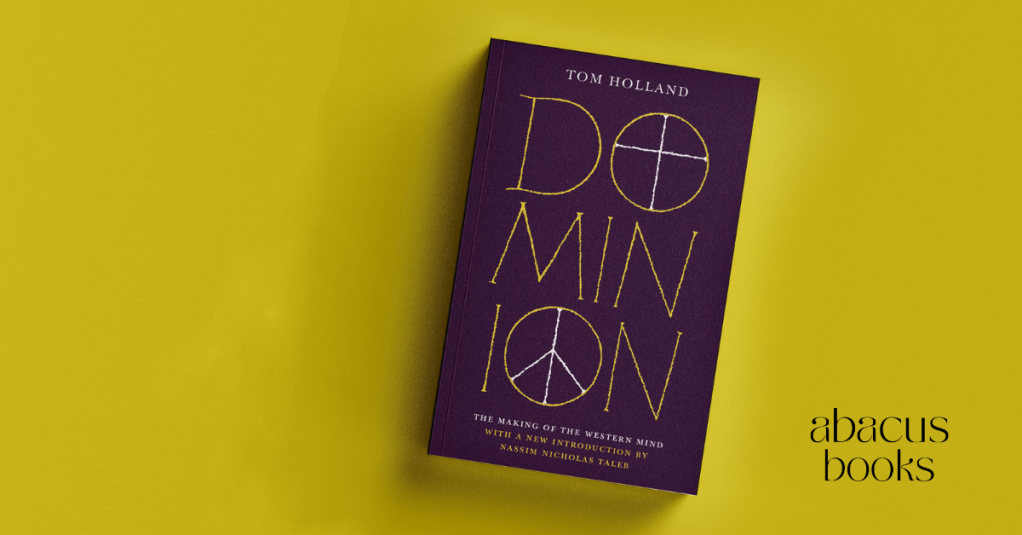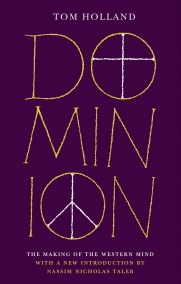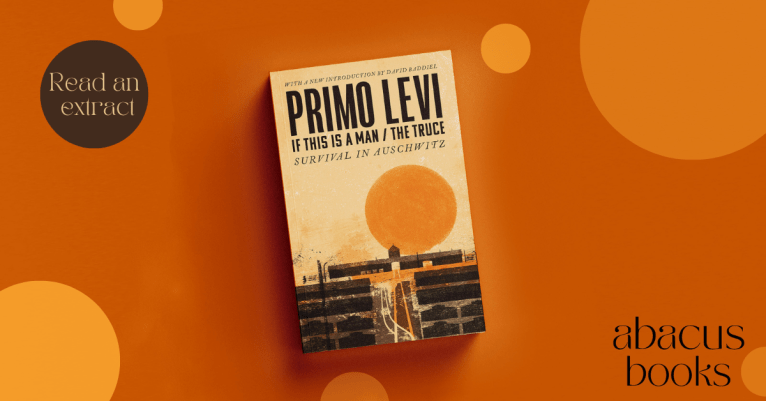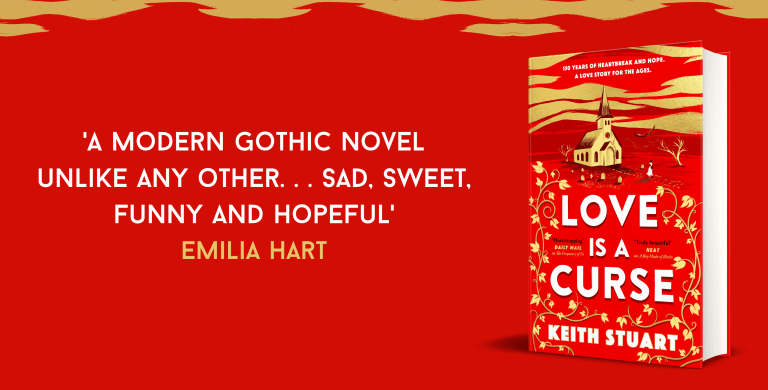Read an extract from Dominion by Tom Holland

The Sunday Times bestseller, with a new introduction by Nassim Nicholas Taleb
‘If great books encourage you to look at the world in an entirely new way, then Dominion is a very great book indeed’ Dominic Sandbrook, Sunday Times
‘Terrific: bold, ambitious and passionate’ Peter Frankopan
‘A masterpiece of scholarship and storytelling’ John Gray, New Statesman
‘Filled with vivid portraits, gruesome deaths and moral debates… Holland has all the talents of an accomplished novelist’ Terry Eagleton, Guardian
DOMINION
How was it that a cult inspired by the execution of an obscure criminal in a long-vanished empire came to exercise such a transformative and enduring influence on the world? To attempt an answer to this question, as I do in this book, is not to write a history of Christianity. Rather than provide a panoramic survey of its evolution, I have sought instead to trace the currents of Christian influence that have spread most widely, and been most enduring into the present day. That is why – although I have written extensively about the Eastern and Orthodox Churches elsewhere, and find them themes of immense wonder and fascination – I have chosen not to trace their development beyond antiquity. My ambition is hubristic enough as it is: to explore how we in the West came to be what we are, and to think the way that we do. The moral and imaginative upheaval that saw Jesus enshrined as a god by the same imperial order that had tortured him to death did not bring to an end the capacity of Christianity for inspiring profound transformations in societies. Quite the opposite. Already, by the time that Anselm died in 1109, Latin Christendom had been set upon a course so distinctive that what today we term ‘the West’ is less its heir than its continuation. Certainly, to dream of a world transformed by a reformation, or an enlightenment, or a revolution is nothing exclusively modern. Rather, it is to dream as medieval visionaries dreamed: to dream in the manner of a Christian.
Today, at a time of seismic geopolitical realignment, when our values are proving to be not nearly as universal as some of us had assumed them to be, the need to recognise just how culturally contingent they are is more pressing than ever. To live in a Western country is to live in a society still utterly saturated by Christian concepts and assumptions. This is no less true for Jews or Muslims than it is for Catholics or Protestants. Two thousand years on from the birth of Christ, it does not require a belief that he rose from the dead to be stamped by the formidable – indeed the inescapable – influence of Christianity. Whether it be the conviction that the workings of conscience are the surest determinants of good law, or that Church and state exist as distinct entities, or that polygamy is unacceptable, its trace elements are to be found everywhere in the West. Even to write about it in a Western language is to use words shot through with Christian connotations. ‘Religion’, ‘secular’, ‘atheist’: none of these are neutral. All, though they derive from the classical past, come freighted with the legacy of Christendom. Fail to appreciate this, and the risk is always of anachronism. The West, increasingly empty though the pews may be, remains firmly moored to its Christian past.
There are those who will rejoice at this proposition; and there are those who will be appalled by it. Christianity may be the most enduring and influential legacy of the ancient world, and its emergence the single most transformative development in Western history, but it is also the most challenging for a historian to write about. In the West, and particularly in the United States, it remains easily the dominant faith. Worldwide, over two billion people – almost a third of the planet’s population – subscribe to it. Unlike Osiris, or Zeus, or Odin, the Christian God still goes strong. The tradition of interpreting the past as the tracing of patterns upon time by his forefinger – a tradition that reaches back to the very beginnings of the faith – is far from dead. The crucifixion of Jesus, to all those many millions who worship him as the Son of the Lord God, the Creator of heaven and earth, was not merely an event in history, but the very pivot around which the cosmos turns. Historians, however, no matter how alert they may be to the potency of this understanding, and to the way in which it has swayed the course of the world’s affairs, are not in the business of debating whether it is actually true. Instead, they study Christianity for what it can reveal, not about God, but about the affairs of humanity. No less than any other aspect of culture and society, beliefs are presumed to be of mortal origin, and shaped by the passage of time. To look to the supernatural for explanations of what happened in the past is to engage in apologetics: a perfectly reputable pursuit, but not history as today, in the modern West, it has come to be understood.
Yet if historians of Christianity must negotiate faith, so also must they negotiate doubt. It is not only believers whose interpretation of Christian history is liable to be something deeply personal to them. The same can be equally true of sceptics. In 1860, in one of the first public discussions of Charles Darwin’s recently published On the Origin of Species, the Bishop of Oxford notoriously mocked the theory that human beings might be the product of evolution. Now, though, the boot is on the other foot. ‘It is the case that since we are all 21st century people, we all subscribe to a pretty widespread consensus of what’s right and what’s wrong.’ So Richard Dawkins, the world’s most evangelical atheist, has declared. To argue that, in the West, the ‘pretty widespread consensus of what’s right and what’s wrong’ derives principally from Christian teachings and presumptions can risk seeming, in societies of many faiths and none, almost offensive. Even in America, where Christianity remains far more vibrant a force than it does in Europe, growing numbers have come to view the West’s ancestral faith as something outmoded: a relic of earlier, more superstitious times. Just as the Bishop of Oxford refused to consider that he might be descended from an ape, so now are many in the West reluctant to contemplate that their values, and even their very lack of belief, might be traceable back to Christian origins.
I assert this with a measure of confidence because, until quite recently, I shared in this reluctance. Although as a boy I was taken every Sunday to church by my mother, and would solemnly say my prayers at night, I found myself at an early age experiencing what I can now recognise as having been an almost Victorian crisis of faith. I still remember the shock I felt when, at Sunday school one day, I opened a children’s Bible and found an illustration on its first page of Adam and Eve with a brachiosaur. Respectful of Bible stories I may have been, but of one thing – to my regret – I was rock- solid certain: no human being had ever seen a sauropod. That the teacher seemed not to care about this error only compounded my sense of outrage and perplexity. Had there been dinosaurs in the Garden of Eden? My teacher seemed neither to know nor to care. A faint shadow of doubt had been brought to darken my confidence in the truth of what I was being taught about the Christian faith.
With time, it darkened further still. My obsession with dinosaurs – glamorous, ferocious, extinct – evolved seamlessly into an obsession with ancient empires. When I read the Bible, the focus of my fascination was less the children of Israel or Jesus and his disciples than their adversaries: the Egyptians, the Assyrians, the Romans. In a similar manner, although I vaguely continued to believe in God, I found him infinitely less charismatic than the gods of the Greeks: Apollo, Athena, Dionysus. I liked the way that they did not lay down laws, or condemn other deities as demons; I liked their rock- star glamour. As a result, by the time I came to read Edward Gibbon and his great history of the decline and fall of the Roman Empire, I was more than ready to accept his interpretation of the triumph of Christianity: that it had ushered in an ‘age of superstition and credulity’. My childhood instinct to see the biblical God as the po- faced enemy of liberty and fun was rationalised. The defeat of paganism had ushered in the reign of Nobodaddy, and of all the various crusaders, inquisitors and black- hatted Puritans who had served as his acolytes. Colour and excitement had been drained from the world. ‘Thou hast conquered, O pale Galilean,’ wrote the Victorian poet Algernon Charles Swinburne, echoing the apocryphal lament of Julian the Apostate, the last pagan emperor of Rome. ‘The world has grown grey from thy breath.’ Instinctively, I agreed.
Yet over the course of the past two decades, my perspective has changed. When I came to write my first works of history, I chose as my themes the two periods that had always most stirred and moved me as a child: the Persian invasions of Greece and the last decades of the Roman Republic. The years that I spent writing these twin studies of the classical world, living intimately in the company of Leonidas and of Julius Caesar, of the hoplites who had died at Thermopylae and of the legionaries who had crossed the Rubicon, only confirmed me in my fascination: for Sparta and Rome, even when subjected to the minutest historical enquiry, retained their glamour as apex predators. They continued to stalk my imaginings as they had always done: like a great white shark, like a tiger, like a tyrannosaur. Yet giant carnivores, however wondrous, are by their nature terrifying. The more years I spent immersed in the study of classical antiquity, so the more alien I increasingly found it. The values of Leonidas, whose people had practised a peculiarly murderous form of eugenics and trained their young to kill uppity Untermenschen by night, were nothing that I recognised as my own; nor were those of Caesar, who was reported to have killed a million Gauls, and enslaved a million more. It was not just the extremes of callousness that unsettled me, but the complete lack of any sense that the poor or the weak might have the slightest intrinsic value. Why did I find this disturbing? Because, in my morals and ethics, I was not a Spartan or a Roman at all. That my belief in God had faded over the course of my teenage years did not mean that I had ceased to be Christian. For a millennium and more, the civilisation into which I had been born was Christendom. Assumptions that I had grown up with – about how a society should properly be organised, and the principles that it should uphold – were not bred of classical antiquity, still less of ‘human nature’, but very distinctively of that civilisation’s Christian past. So profound has been the impact of Christianity on the development of Western civilisation that it has come to be hidden from view. It is the incomplete revolutions which are remembered; the fate of those which triumph is to be taken for granted.
The ambition of Dominion is to trace the course of what one Christian, writing in the third century ad, termed ‘the flood- tide of Christ’: how the belief that the Son of the one God of the Jews had been tortured to death on a cross came to be so enduringly and widely held that today most of us in the West are dulled to just how scandalous it originally was. This book explores what it was that made Christianity so subversive and disruptive; how completely it came to saturate the mindset of Latin Christendom; and why, in a West that is often doubtful of religion’s claims, so many of its instincts remain – for good and ill – thoroughly Christian.
It is – to coin a phrase – the greatest story ever told.
Discover the book:








